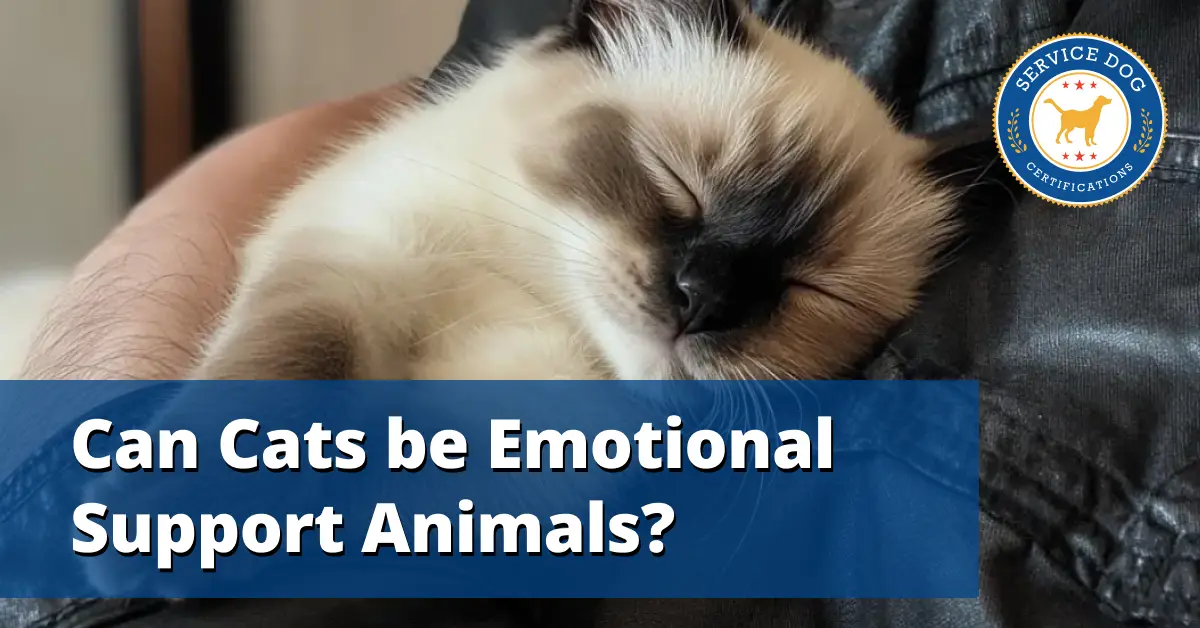Emotional Support Cat

Cats can legally be emotional support animals because studies like this one have shown that cat owners have better psychological health than non-pet owners, and this one showed that cats can help reduce stress by lowering blood pressure and resting heart rates. Cats can qualify as emotional support animals because they have been proven to alleviate the symptoms of certain mental disorders in studies like these. If you want to turn your cat into an official emotional support animal, all you need is an ESA letter from a state-licensed healthcare professional.
Making your cat an emotional support animal is easy. This guide will walk you through everything you want to know, including how to prepare it and the best way to get your ESA letter.
In this article:
- What is an emotional support cat?
- Do you need to register your emotional support cat?
- Can a cat be a service animal?
- Emotional Support Cat Certification
- How many emotional support cats can I have?
What is an emotional support cat?
An emotional support cat is any feline that provides their owner with relief from active mental health issues through their presence, noises, or touch. All cat breeds can qualify as emotional support animals, and some may have instincts that work better for specific disorders. For instance, Maine Coons, with their friendly and sociable demeanor, can be particularly effective for depression. Similarly, Ragdolls and Persians, known for their gentle and calm nature, can help soothe anxiety.
An emotional support cat does not require any special training, and the cat you already have may be the perfect ESA for you. You just need to obtain an ESA letter from a therapist or doctor to legally show that they’re an actual emotional support animal.
Do you need to register your emotional support cat?
No, you don’t need to register an emotional support cat, but many owners choose to register their cat in a searchable registry for certain benefits. For example, by registering your emotional support cat with us, you can obtain a linked ID card, which is a handy way to quickly show others that your cat is an emotional support animal and not a regular pet.
Can a cat be a service animal?
No, a cat cannot be a service animal because they are not covered by the ADA. Service animals are dogs that are specifically trained to perform tasks, including picking up dropped items, opening doors, or alerting their owners to a drop in their blood sugar or an oncoming seizure. Even though cats can be highly intelligent and trainable, the ADA does not recognize them as service animals.
Emotional support cats still have rights under the Fair Housing law. Landlords must allow for your emotional support cat if you submit an ESA letter, even if they have a “no pets” policy. Emotional support cats are also exempt from pet fees and deposits. Even if you currently live in a building that allows pets, having an ESA letter can give you peace of mind if you need to move in the future.
Emotional Support Cat Certification
You can get an emotional support cat certification after you get your ESA letter from a licensed therapist or mental health professional. A certificate is not required by law, but it’s another way to demonstrate to others that you have an ESA. Your landlord can’t insist on seeing a certificate to prove that you have an emotional support animal, but they can demand to see your ESA letter.
How many emotional support cats can I have?
You can have as many emotional support cats as your licensed healthcare professional will qualify you for, as HUD does not specify any hard limits. Once each cat is certified with an ESA letter, they all get the housing benefits and are protected from being removed or paying pet fees under Fair Housing rules.
Your landlord does need to make reasonable accommodations under the Fair Housing Act — but they might have concerns if you’re planning to turn your apartment into a cat sanctuary. Fair enough, right? Landlords can limit the ESAs you have if they have legitimate safety or health concerns.
Another question is what you can handle. Each cat needs vet care, attention, space to romp around, and, of course, food and supplies. Those costs add up quickly, and each kitty needs quality time to be an effective emotional support animal.
Most mental health folks suggest starting with one cat and seeing how it goes. You can always welcome another furry friend later if you feel you need more support and can manage the extra responsibility.
At the end of the day, it’s about finding what works best for you — balancing the emotional support you need with making sure each cat gets the care and attention they deserve. Sometimes one perfect feline companion is all you need, while others might benefit from having two or three support cats in their life.

About the Author: The writing team at Service Dog Certifications is made up of folks who really know their stuff when it comes to disability laws and assistance animals. Many of our writers and editors have service dogs themselves and share insights from their own experiences. All of us have a passion for disability rights and animals.
Related Articles

How to Qualify for An Emotional Support Animal
To qualify for an emotional support animal under the Fair Housing Act, you need to follow these three steps: The most important step is getting an ESA letter that meets HUD’s housing rules for emotional support animals. Make sure your ESA letter has the following: You should also ensure that your ESA letter is not […]

Read More

How to Get an Emotional Support Dog Letter
To make your dog your official emotional support animal, you need a signed ESA letter from a healthcare professional. That might sound like a lot of work at first, but getting an emotional support dog letter really just involves three easy steps: Let’s break down each of these steps so you know exactly what to […]

Read More

What to Do if Your Landlord Does Not Accept Your Emotional Support Animal
If your landlord has said no to your emotional support animal, there’s no need to panic; HUD’s rules are on your side. In this article we’ll let you know what you need to do and provide templates for you to smooth communications with your landlord. In this article: Keep in mind that most but not […]

Read More


My experience has been that my neighbour who qualified for a ESA because of his mental health was not a good pet owner… probably because of his mental health..
I have a. Cat for depression and Panic attacks. Please tell me how to register her. My Dr wrote a note to apartment complex. I want to move plus fly and my cat (grace) I want to go. Getting ready take her to Vet. She is up to date on her shots. I want to no if she is a service cat or a theropy cat and do I need put her in class. Like to have vest to show what kind of cat she is. She has really help me allot. Thanks for your help. She is a inside cat unless she goes to Vet. I am sick and on oxygen so we don’t walk around out side. Thank you for your help
The article answers all of your questions
Hi, I hope all is well. I know you wrote this awhile ago but I wanted to answer your questions:
– There is no “official” registration hub for an emotional support animal. While having support from third-party organizations provides some relief for the owners in that they have more legitimacy in the form of a certificate, you are not obligated to have anything except the letter from whoever is overseeing your healthcare (especially a mental health worker). The letter is crucial and I believe it should name your conditions, how they impact your everyday life, and how the ESA helps diminish that negative impact. The note that your doctor wrote sounds like it’s in the right direction, and you’ll probably want to send something similar to your new apartment complex.
– As for what to call her, she is not a “service cat”. This is a title reserved for animals that go through extensive training; in other words, the more conventional idea of a service dog being a seeing eye dog for someone who is blind or a medical alert dog before narcoleptic or anxiety attacks. Also, personally, I wouldn’t call her a “therapy cat”. To me at least, this implies training and that she can benefit the people around you. While she can benefit you and the household, the idea of a “therapy cat” implies that she can give these feelings to anyone and that she has trainings to do so. In your case, the proper term would be “emotional support animal”, abbreviated as ESA, or “emotional support cat”.
– While the basics of training are expected in public places (don’t attack anyone, don’t be a disturbance, the most basic things for a pet owner to teach), you do not have to take your cat to any additional trainings. You also don’t have to have her in a vest. When you register for your ESA to live with you, you are providing confidential information about your mental/physical health and treatment. She is protected because of these things. However, you do not have to advertise it. No need for you to tell everyone if you don’t want to, and no one will be able to give you a hard time about your cat’s presence because she is an approved animal. This is especially the case as she is an indoor cat, the only time people would be seeing her is if she’s going to the vet, and you aren’t obligated to explain yourself to the people you pass in the hall! If you wanted to get her a vest so people would not approach her, you would have to get some measurements of her and get a vest with the “emotional support animal” or “ESA” Velcro patches.
I hope you are doing well. I know your comment was awhile old but I hoped my answers can help you or whoever else is reading. I just wanted to add that my experience is: – double major in Psychology and Neuroscience – very experienced with residential life at universities and schools – have my own ESA who has lived with me in many situations
Sounds good
Is there a way to find out if a cat is a true ESA if a person cannot find their paperwork?
There is no ESA registry to look up the animals. The owner of the ESA should be able to connect with the doctor or therapist who issued their letter and get a copy.
My cat named Rocky was a barn baby. He is an orange tabby with a beautiful personality. He luvs baby’s children and seniors as my parents are 84 and 79. I would luv to share him with people as he is leash trained.
Hello, I want to know if is any place in Michigan to training my cat as emotional support cat
Emotional support animals do not need any specific training. Their presence alone would provide the comfort and support needed. You do, however, need an ESA letter issued by a medical professional licensed in your state of residence that states that you benefit from an emotional support cat. You may find this article on how to get an emotional support animal letter interesting: https://www.servicedogcertifications.org/how-to-get-an-emotional-support-dog-letter/
I really think I have Major Depressive Disorder as I have all the symptoms but I don’t know for sure. My mum has no idea. When I am around cats it makes me feel calm and safe but my mum hates them. We are moving house soon but are only renting somewhere for a year soon whilst we look. Or, that is what we think. So obviously we may not be able to get a pet. But that is fine, she wants a dog, so does my sister which is really annoying because they are trying to make me like them even though they know that if I can’t make them like cats then they can’t make me like dogs. I really hate them and would love a cat to help me with my emotions. My dad is currently living with my Nan and will hopefully get an apartment where we can get a rescue kitten. I am really looking forward to it but I only see him on Tuesday and Thursday evenings and every other weekend. sometimes he has gigs with his band so I don’t even see him then. I want to live with my mum and sister mainly still but if they get a dog it may make things worse instead of better. Please could someone help me because I am clueless? Thank you.
I have PTSD from many bank robberies at the bank where I work, plus several home invasions
Plus I am a psychic empath and telepath which means I can feel and hear other other emotions.
My cat,Chester, helps all of that. Our loving rat terrier does not. The cats we had before did not
Chester is different. I am 65 and really hope I can get him certified. I do have a psychologist. This gives me hope.
Chester is very calm and friendly to all
I love my cat pretty i have no recorded disorders but have an awful time talking to people i don’t know or haven’t met before and pretty comforts me a lot makes me feel safer but pretty has grown to be afraid to leave the house and i have to go to a summer camp for a week i don’t know how i am going to get through the whole week having problems talking to people i don’t know and as far as i know no one there is going to be someone i know. i am just hoping i convince my mom to allow her to become a emotional support animal so i don’t feel so alone while i am there. i need some advice. Thank you.
I want to to get an ESA for our cat our son has autism and the cat we have helps him with his panic attack and it keeps him calm we don’t have much money but I wanna get our cat ESA plz any help
Please see this article on how to get an ESA letter (the article is for dogs but the same process applies to cats): https://www.servicedogcertifications.org/how-to-get-an-emotional-support-dog-letter/
I have 1 cat an I need emotional support letter. What are the requirements an information I need to know get that. How much is cost ?
You can read more about how to get an ESA letter here: https://www.servicedogcertifications.org/how-to-get-an-emotional-support-dog-letter/
Need a letter stating that my cat Louis is my support animal
Cats can make for really wonderful ESAs! If you need help getting an ESA letter, please see this link: https://www.servicedogcertifications.org/esa-letter/
It’s taking to long for my doctor to make me a letter what could I do I had my cat for 10 years and I sleep with him I take a both he right he my pal were ever I go he right there I go through society stress anxiety what can I do
Check out this link for more info on how you can get an ESA letter online: https://www.servicedogcertifications.org/how-to-get-an-emotional-support-dog-letter/
Hello,
I have four cats which they are life saving for me. I have depression and add. I was wondering can I make them service pets?
Unfortunately ADA guidelines only recognize dogs as service animals. Your cats however can certainly qualify as legal emotional support animals if you get an ESA letter.